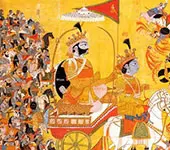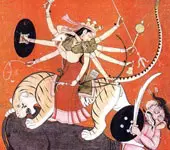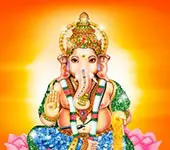खद्योतो द्योतते तावद् यावन्नोदयते शशी |
उदिते तु सहस्रांशौ न खद्योतो न चन्द्रमाः ||
This verse uses the metaphor of the firefly, the moon, and the sun to convey the idea of relative significance and the impact of true greatness.
In the first line, 'खद्योतो द्योतते तावद् यावन्नोदयते शशी,' the firefly (खद्योत) shines as long as the moon (शशी) does not rise. This signifies that in the absence of something greater, even small things may seem important. The firefly’s light is feeble, but in darkness, it can still be noticed. Similarly, in our lives, when there is no greater influence or presence, minor achievements or qualities may appear valuable. This reflects how ego or superficial accomplishments often appear significant when there is no higher wisdom or greater force.
In the second line, 'उदिते तु सहस्रांशौ न खद्योतो न चन्द्रमाः,' when the sun (सहस्रांशु) rises, neither the firefly nor the moon matter. The brilliance of the sun is so powerful that both the small light of the firefly and the soft glow of the moon become completely irrelevant. This teaches that when true greatness, wisdom, or divine presence shines, all lesser entities fade away. Even the moon, which seemed so bright in the absence of the sun, loses its importance.
The verse gives a profound lesson: in the presence of true wisdom, higher purpose, or the divine, smaller and temporary things lose their value. It encourages humility and understanding that what seems significant in isolation may lose relevance when compared to a much greater truth or power. The firefly and the moon represent human ego and temporary achievements, while the sun represents ultimate truth or enlightenment.
Lessons -
- In a limited environment or without higher comparison, individuals often overestimate their abilities or significance. This is how the ego inflates when it isn't challenged by broader, more meaningful perspectives or realities. Social comparison reshapes one’s perception of their own importance.
- The ego creates a false sense of separateness from the divine or ultimate truth. In the context of this verse, the firefly represents the ego, which shines in the absence of higher spiritual awareness. As one progresses spiritually, they begin to realize that the ego’s light (self-importance) is insignificant compared to the larger spiritual reality.
- The 'sun' represents ultimate spiritual enlightenment or union with the divine, where the sense of individual self dissolves into a greater whole. The individual transcends personal needs and desires to connect with a larger purpose or divine reality.
- The individual must relinquish control and personal identity to merge with divine will.
Comments
Read more comments
Knowledge Bank
Agnishaucham
Nala got separated from Damayanti. He was roaming around in the forest. At that time, he got bitten by the serpent, Karkotaka. He became ugly beyond recognition due to the effect of the poison. Then, Karkotaka gave him a cloak with magical power called Agnishaucham (अग्निशौचम्). Wearing this, Nala could get back his original form.
Who are the parents of Veda Vyasa?
Veda Vyasa’s father is Parashara and his mother is Satyavati.



